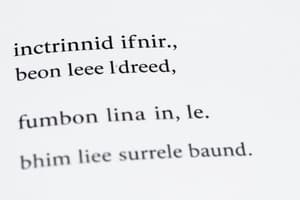Podcast
Questions and Answers
Which reflexive pronoun correctly completes the sentence: 'I will finish the project ___.'?
Which reflexive pronoun correctly completes the sentence: 'I will finish the project ___.'?
- himself
- myself (correct)
- themselves
- yourself
Which demonstrative pronoun correctly completes the sentence: '____ flowers are blooming beautifully.'?
Which demonstrative pronoun correctly completes the sentence: '____ flowers are blooming beautifully.'?
- This
- Those
- That
- These (correct)
Which relative pronoun correctly completes the sentence: 'The book ___ I borrowed was amazing.'?
Which relative pronoun correctly completes the sentence: 'The book ___ I borrowed was amazing.'?
- that (correct)
- who
- whose
- which
Which reflexive pronoun correctly completes the sentence: 'She built the entire model ___.'?
Which reflexive pronoun correctly completes the sentence: 'She built the entire model ___.'?
Which demonstrative pronoun correctly completes the sentence: '____ is the bike I want.'?
Which demonstrative pronoun correctly completes the sentence: '____ is the bike I want.'?
What is the antecedent in the sentence 'The dog wagged its tail when it saw the treat'?
What is the antecedent in the sentence 'The dog wagged its tail when it saw the treat'?
Which of the following is an example of a subject pronoun?
Which of the following is an example of a subject pronoun?
What type of pronoun is used in the sentence 'Mom made a sandwich for me'?
What type of pronoun is used in the sentence 'Mom made a sandwich for me'?
Which sentence uses a possessive pronoun correctly?
Which sentence uses a possessive pronoun correctly?
Which of the following sentences contains a reflexive pronoun?
Which of the following sentences contains a reflexive pronoun?
In the sentence 'Can you help us with our project?', what type of pronoun is 'us'?
In the sentence 'Can you help us with our project?', what type of pronoun is 'us'?
Which of the following options is a possessive adjective?
Which of the following options is a possessive adjective?
What distinguishes an intensive pronoun from a reflexive pronoun?
What distinguishes an intensive pronoun from a reflexive pronoun?
Flashcards are hidden until you start studying
Study Notes
Antecedents
- An antecedent refers to the noun a pronoun replaces within a sentence.
- Examples:
- "Sally rode her bike." (antecedent: Sally, pronoun: her)
- "The dog wagged its tail." (antecedent: the dog, pronoun: its)
Personal Pronouns
- Subject pronouns are used as the subject of a sentence (I, you, he, she, it, we, they).
- Object pronouns are used after a verb or preposition (me, you, him, her, it, us, them).
Possessive Pronouns vs. Possessive Adjectives
- Possessive pronouns stand alone and replace a noun (mine, yours, his, hers, ours, theirs).
- Possessive adjectives come before a noun to show ownership (my, your, his, her, its, our, their).
Reflexive and Intensive Pronouns
- Reflexive pronouns refer back to the subject of a sentence (myself, yourself, himself, herself, itself, ourselves, yourselves, themselves).
- Intensive pronouns emphasize the subject and can be removed without changing the meaning of the sentence.
Demonstrative Pronouns
- Demonstrative pronouns indicate specific things or people (this, that, these, those).
- "this" and "that" are singular.
- "these" and "those" are plural.
- "this" and "these" refer to things that are closer.
- "that" and "those" refer to things that are farther away.
Relative Pronouns
- Relative pronouns connect a clause to a noun or pronoun (who, whom, whose, which and that).
Studying That Suits You
Use AI to generate personalized quizzes and flashcards to suit your learning preferences.



